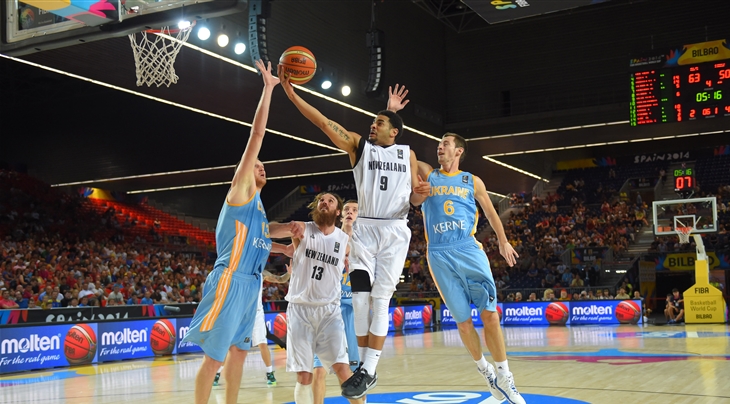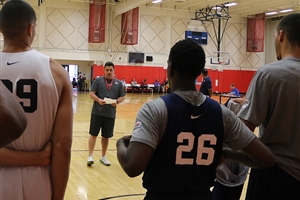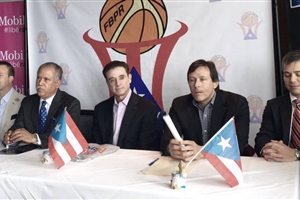
Can those Kiwis keep doing it?
MELBOURNE (Paulo Kennedy's View from Downunder) - How do those Kiwis do it? It's not the first time I've asked that question, although another pertinent poser at the moment is can they keep doing it?
There were a couple of examples of the former this week, but they both shone a light on how difficult the latter might become.
The New Zealand Breakers this week announced they had secured the signature of FIBA Basketball World Cup star Corey Webster for another three years.
Add his to new long-term deals with Tall Blacks starters Mika Vukona and Tom Abercrombie, along with big man Alex Pledger, and the Breakers have four of New Zealand’s absolute finest on home soil.
He's BACK! @cwebster9 signs a 3 year deal! Check http://t.co/cntIcK9iVG for full article. #breakernation
— New Zealand Breakers (@NZBreakers) June 14, 2015
In today's global environment, it's not easy keeping world class players Downunder - and all three of their recent returnees had quality European options - but somehow the Breakers do it year after year.
Full credit to them, although they don't need any extra reward, they've won four of the past five NBL championships to become probably the greatest dynasty in league history.
3x3 glee
The other 'how do they do it' moment was Tai Wynyard, Sam Timmins, Nikau McCullough and Matthew Freeman claiming New Zealand's second U18 3X3 world championship world title.
The Kiwis are becoming masters of the shortened form of the game, having claimed the inaugural gold medal behind the efforts of Tai Webster, Reuben Te Rangi, Isaac Fotu and James Ashby in 2011.
These young guns harness their potential in the Breakers Academy, shock the world in the 3x3 format, and in the case of Tai Webster, Wynyard, Te Rangi and Fotu, step into senior international basketball at a ridiculously young age.
World Champions!!! NZL won the #3x3U18 v Argentina! Congratulations @WynyardTai @SamTimmins33 @trapneeks @mattyfreeman33
— BBNZ (@theofficialBBNZ) June 7, 2015
As Abercrombie, Pledger, Vukona and Corey Webster show, the next step is to become NBL stars for the Breakers, honing their game in tough playoff competition, playing and training with their national teammates every day, and then repping their country every international season.
The cherry on the Kiwi sundae is many Tall Blacks then do their thing in the NZ NBL to help bring on the next generation.
The whole thing is almost too good to be true. Looking at the progress of New Zealand's young stars - and only four World Cup Tall Blacks in the domestic league - maybe it will be in a few years.
Where are the young guns?
Four years on from the 2011 triumph, only Te Rangi is wearing a Breakers uniform.
Fotu is in Spain, Rob Loe in Greece, and despite receiving limited opportunities in Nebraska, Tai Webster continues to spurn the Breakers offers and remain stateside.
For the moment, most of the 'next generation' of Tall Blacks have in fact bypassed the Breakers senior roster.
Of course, the club's immediate playing stocks are well and truly secure - especially with Cedric Jackson signed long term and keen to naturalise - but there is some work to do beyond that.
When will it be Tai time?
The Breakers must find a way to convince the next generation that the North Shore is a place where they can develop their best basketball and then excel at higher levels, as those before them have.
It's not just important for the Breakers, but unless a player is excelling overseas, it's best for the Tall Blacks to have him at home.
The Breakers signing Shane McDonald this week confirms that Tai Webster won't be returning home this season, but after averaging just 18 minutes a game at Nebraska, is it time for him to seriously consider if he is on track to unlock his enormous potential?
The New Zealand franchise truly cares about their players, both because they're a great organisation and because that’s good for their business. Guys like Corey and Tai Webster are their future.
How many colleges or overseas franchises have that level of care for their players? Perhaps that’s why such a talented quintet as Pledger, Vukona, Abercrombie, Webster and Jackson have locked in long-term?
Where are the Kiwi guards?
It's great news for McDonald that he finally gets another opportunity in the NBL.
Having struggled physically in his first couple of pro stints, McDonald was unable to attract a significant offer and instead turned his attention to a teaching career while playing in the semi-professional SEABL competition.
Now, after dominating that competition for many years with Nunawading, we finally get to see if he has stepped up his game from those early days. He’s certainly earned the opportunity.
We're so pumped for @shane_mac4 who signed with the @NZBreakers @NBL #earnedit #buckets #dimes #nunawadingbasketball pic.twitter.com/LialgpCl7y
— Nunawading Spectres (@NunaSpectres) June 19, 2015
From a New Zealand basketball perspective, there must be some disappointment that another Australian has been signed, particularly with 2009 FIBA U19 World Championship gun Brook Ruscoe really coming of age for Manawatu in the NZ NBL, averaging 20.3 points per game.
Similarly, 22-year-old point man Shea Ili has helped the Southland Sharks put together a 12-game winning streak with some promising all-around play.
Obviously the Breakers wanted someone with the poise, passing and perimeter play of departed title-winner Rhys Carter - which neither of those Kiwis offer as a speciality- and their selections have a pretty good track record.
But continuing the theme of how does New Zealand basketball keep this roll going – which has also seen them in the knockout rounds of four straight World Cups – it must be concerning that just two Kiwi guards have professional contracts.
With that dearth of playmakers, I suspect they will need Jackson naturalised to make it to Rio, be that through Oceania or the FIBA Olympic Qualifying Tournament.
Second Kiwi bid progresses
One potential solution is a second NBL team out of the Land of the Long White Cloud, and the bid from the Wellington region this week announced they are in the market for investors.
Spokesman Bill Wallace revealed the bid's structure had been approved by the NBL and they now wanted to turn their plans into reality, if the money is out there.
Getting more Kiwi hoopsters into professional environments is crucial for taking the next step as a basketball country, because you can only compete at the international level with less than 10 full-time professional players for so long.
This is especially the case when you consider the elephant in the room, the fact that supercoach Nenad Vucinic has moved on, taking with him a world of experience at making players better than anyone suspected.
Paulo Kennedy
FIBA
FIBA's columnists write on a wide range of topics relating to basketball that are of interest to them. The opinions they express are their own and in no way reflect those of FIBA.
FIBA takes no responsibility and gives no guarantees, warranties or representations, implied or otherwise, for the content or accuracy of the content and opinion expressed in the above article.


















